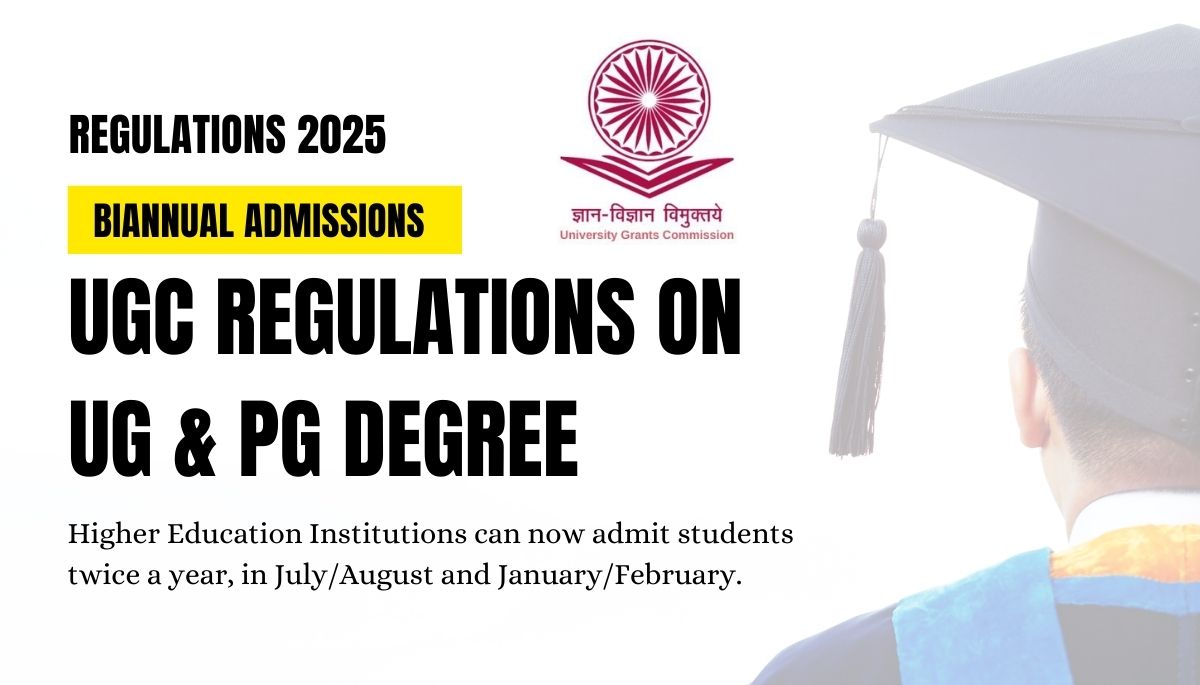UGC’s New Rules 2025: Biannual Admissions Now Allowed in Higher Education
India’s higher education system is undergoing a
significant transformation in 2025, thanks to the latest reforms introduced by
the University Grants Commission (UGC). Among the most student-centric
changes is the implementation of biannual admissions in Undergraduate
(UG) and Postgraduate (PG) degree programs. This development marks a
major shift toward flexibility, accessibility, and alignment with global
academic standards.
Let’s explore what biannual admissions mean,
how they benefit students, and why this change is a game-changer for higher
education in India.
🎯
What Are Biannual Admissions?
Biannual admissions
refer to the policy that allows students to enroll in degree programs twice
a year—once during the July/August session and again in the January/February
session.
Until now, most Indian colleges and universities only
admitted students once a year. This often-caused delays and missed
opportunities for students who, for various reasons, couldn’t apply or join
during the primary admission cycle.
With the new UGC regulation, Higher Education Institutions (HEIs) are now permitted to offer two admission cycles annually, bringing them in line with international academic practices.
📌
Key Highlights of the New UGC Biannual Admission Rule
- Two
Admission Sessions:
- First
session: July–August
- Second
session: January–February
- Applicable
for All Degree Programs:
- Undergraduate
(UG) and Postgraduate (PG) programs across disciplines
- Institutional
Readiness:
- HEIs
must ensure infrastructure and faculty support are in place for managing
two cohorts.
- UGC
Compliance Required:
- Institutions must follow proper procedures and seek approval if not already under the biannual system.
🎓
Why This Move Matters for Students
Biannual admissions come with several benefits that
put students first:
1. 📅 No More Long Waits
Missed the July admission window? No worries—you now
have another chance in January. This reduces stress and keeps students on track
without losing a whole year.
2. 🛫 Flexibility for
International and Working Students
Students moving between states or countries, or those
who need a gap due to personal circumstances, now have a second entry point
without being penalized by the calendar.
3. 🧑💼 Greater Opportunities
for Skill Development
Students can use the interim months between cycles to
pursue internships, skill-based courses, or other certifications, enhancing
their overall profile.
4. 🌍 Aligns with Global
Systems
Most international universities offer biannual or rolling admissions. This reform brings Indian education systems in sync with global standards, making cross-border academic movement smoother.
📝
How to Apply for Biannual Admissions?
The UGC has advised students to regularly visit the
websites of their preferred universities or colleges. Admission notices for
both sessions will be published with clear instructions regarding:
- Eligibility
criteria
- Entrance
exam requirements
- Academic
calendar
- Deadlines
and important dates
Students are also encouraged to create a Digi locker account and link it with the Academic Bank of Credits (ABC) to streamline their academic records.
📢
What Experts Are Saying
According to UGC officials, the goal is to increase
Gross Enrollment Ratio (GER) in higher education by offering more flexible
entry points. Experts believe this change will:
- Decrease
dropout rates
- Encourage
re-enrollment
- Improve
student satisfaction
- Enhance India’s global education standing
Conclusion
The UGC’s new rule of biannual admissions is
more than a policy update—it’s a revolutionary step towards an inclusive,
adaptable, and future-ready education system. Whether you’re a first-time
college aspirant or someone returning to complete your education, this rule
gives you a second chance each year to start your academic journey
without delay.
📄
Want to read the full UGC notification?
👉 Download the official UGC Regulations 2025 PDF
📘 Highlights of UGC Regulations 2025 on UG & PG Degree
— UGC INDIA (@ugc_india) May 2, 2025
🎓 Higher Education Institutions can now offer biannual admissions, allowing students to enroll twice a year, in July/August and January/February.
📖 Read the regulations: https://t.co/tTcKb8D1ml#UGC #NEP2020… pic.twitter.com/UhJs5CXuVg


Post a Comment